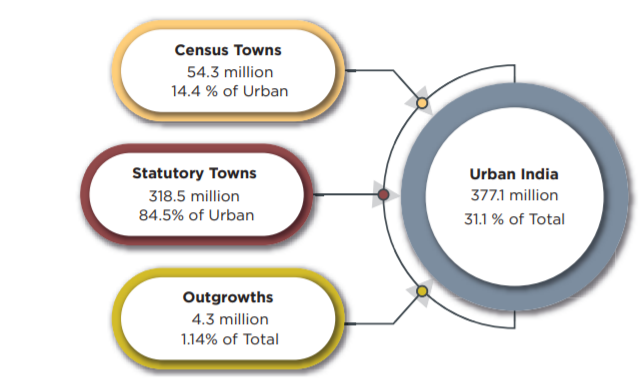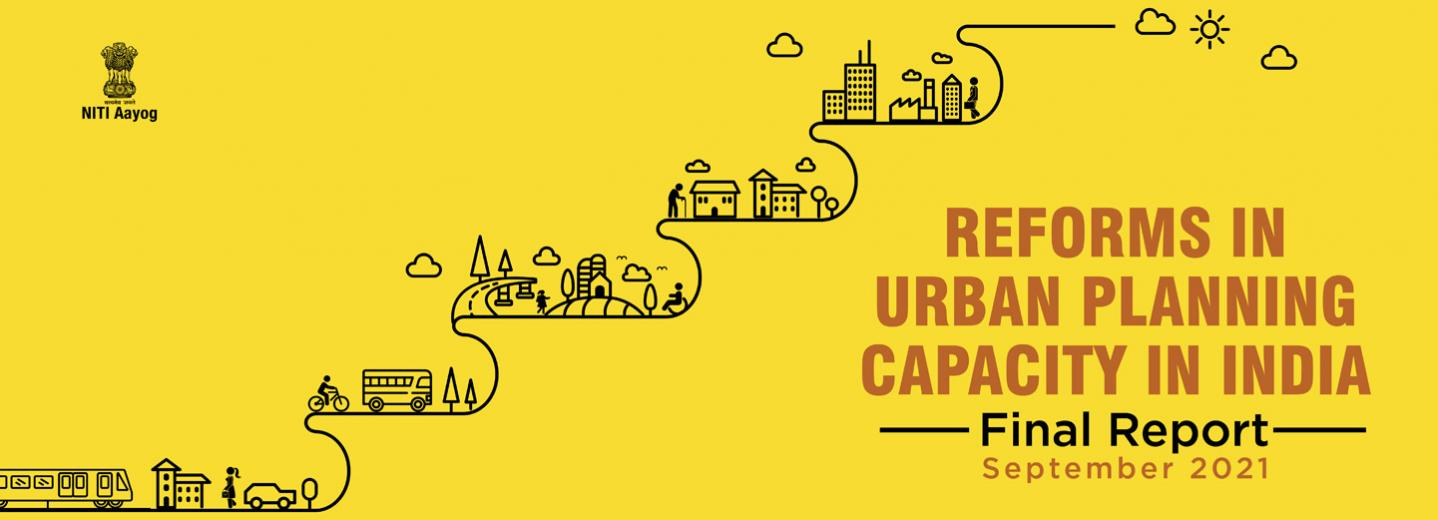Report on Reforms in Urban Planning Capacity
Figure 3: No Copyright Infringement Intended
Context:
- NITI Aayog has launched a report on measures to ramp up urban planning capacity in India.
Need for Urban Planning Capacity:
- In the coming years, urban India will power the growth of the Indian economy.
- Urban challenges, including town planning, need greater policy attention in our country.
- There is a compelling need to plug the gaps in urban-planning capacity in the country, else a huge opportunity for rapid, sustainable and equitable growth would be at risk of being missed
- By planning, Greater synergies among the public and private sectors and education institutions will provide a massive boost towards making Indian cities more livable, competitive, and sustainable.
- Over the years, the country has witnessed the expansion of cities based on car-centric planning. However, the future of urban mobility and urban living needs to evolve on the back of public transportation.
- The cities need to be very compact and adopt a circular economy system to minimize their negative impacts on the environment.
- India’s urban story may be lauded globally or suffer irreversible damages in the next 10-15 years depending upon corrective policy measures and actions taken at the beginning of this decade.
Challenges with urban planning:
- Our urban planning machinery has not grown at the pace of the demands posed by urbanisation and global technological advancements.
- Urban local bodies face a massive shortage of skilled and trained human resources as well as financial challenges.
- Of the 7933 towns that are accounted as urban, almost half have a status of census towns and they continue to be governed as rural entities. With business as usual, the country may become a haven for unplanned urbanization.
- Furthermore, poor quality of planning is a huge limiting factor to realize the true economic potentials of urbanization.
- Urban planning, which is the foundation for the integrated development of cities, citizens, and the environment, has not received adequate attention.
- 65% of the 7933 urban settlements do not have any master plan. This leads to piecemeal interventions, haphazard constructions, urban sprawl, and environmental pollution, which can further aggravate issues such as traffic congestion, flooding, etc.
- In many cities, development control regulations were formulated several decades ago and have been updated arbitrarily without sufficient empirical evidence on their impacts.
- An inadequate number of urban planners in the State planning machineries and lack of multi-disciplinary teams are serious issues.

Data on Urban India:
- India’s population stood at 1210 million in 2011, with an urbanisation level of 31.1% (Census of India 2011).
- India’s urban population is 11% of that of the world. This is still more than highly urbanised countries/regions like the United States, Japan, Western Europe, and South America
- India’s urbanisation is poised to accelerate in the coming decades. During 2011–36, urban growth will be responsible for 73% of the rise in total population.
Recommendations of the Report:
- Programmatic Intervention for Planning of Healthy Cities: Every city must aspire to become a ‘Healthy City for All’ by 2030. The report recommends a Central Sector Scheme ‘500 Healthy Cities Programme’, for a period of 5 years, wherein priority cities and towns would be selected jointly by the states and local bodies.
- Programmatic Intervention for Optimum Utilization of Urban Land: All the cities and towns under the proposed ‘Healthy Cities Programme’ should strengthen development control regulations based on scientific evidence to maximize the efficiency of urban land (or planning area). The report recommends a sub-scheme ‘Preparation/Revision of Development Control Regulations’ for this purpose.
- Ramping Up of Human Resources: To combat the shortage of urban planners in the public sector, the report recommends that the states/UTs may need to a) expedite the filling up of vacant positions of town planners, and b) additionally sanction 8268 town planners’ posts as lateral entry positions for a minimum period of 3 years and a maximum of 5 years to meet the gaps.
- Ensuring Qualified Professionals for Undertaking Urban Planning: State town and country planning departments face an acute shortage of town planners. This is compounded by the fact that in several states, ironically, a qualification in town planning is not even an essential criterion for such jobs. States may need to undertake requisite amendments in their recruitment rules to ensure the entry of qualified candidates into town-planning positions.
- Re-engineering of Urban Governance:There is a need to bring in more institutional clarity and also multi-disciplinary expertise to solve urban challenges. The report recommends the constitution of a high-powered committee to re-engineer the present urban-planning governance structure. The key aspects that would need to be addressed in this effort are: i) clear division of the roles and responsibilities of various authorities, appropriate revision of rules and regulations, etc., ii) creation of a more dynamic organizational structure, standardisation of the job descriptions of town planners and other experts, and iii) extensive adoption of technology for enabling public participation and inter-agency coordination.
- Revision of Town and Country Planning Acts: Most States have enacted the Town and Country Planning Acts, that enable them to prepare and notify master plans for implementation. However, many need to be reviewed and upgraded. Therefore, the formation of an apex committee at the state level is recommended to undertake a regular review of planning legislations (including town and country planning or urban and regional development acts or other relevant acts).
- Demystifying Planning and Involving Citizens:While it is important to maintain the master plans’ technical rigour, it is equally important to demystify them for enabling citizens’ participation at relevant stages. Therefore, the committee strongly recommends a ‘Citizen Outreach Campaign’ for demystifying urban planning.
- Steps for Enhancing the Role of Private Sector: The report recommends that concerted measures must be taken at multiple levels to strengthen the role of the private sector to improve the overall planning capacity in the country. These include the adoption of fair processes for procuring technical consultancy services, strengthening project structuring and management skills in the public sector, and empanelment of private sector consultancies.
- Steps for Strengthening Urban Planning Education System
- The Central universities and technical institutions in all the other States/UTs are encouraged to offer postgraduate degree programmes (MTech Planning) to cater to the requirement of planners in the country in a phased manner.
- The committee also recommends that all such institutions may synergize with Ministry of Rural Development, Ministry of Panchayati Raj and respective state rural development departments/directorates and develop demand-driven short-term programmes on rural area planning.
- ‘Planning’ as an umbrella term, including all its specializations such as environment, housing, transportation, infrastructure, logistics, rural area, regional, etc., or any other nomenclature approved by AICTE, should be included as a discipline under the National Institute Ranking Framework (NIRF) of MoE to encourage a healthy competition among the institutions.
- The committee recommends that AICTE may retain the names of specializations based on industry requirements, while limiting them to an appropriate number, as 25 nomenclatures seem too high for market acknowledgement and absorption.
- Faculty shortage in educational institutions conducting degree and PhD programmes in planning need to be resolved in a time bound manner by 2022.
- Measures for Strengthening Human Resource and Match Demand–Supply:The report recommends the constitution of a ‘National Council of Town and Country Planners’ as a statutory body of the Government of India. Also, a ‘National Digital Platform of Town and Country Planners’ is suggested to be created within the National Urban Innovation Stack of MoHUA. This portal will enable self-registration of all planners and evolve as a marketplace for potential employers and urban planners.




1.png)
